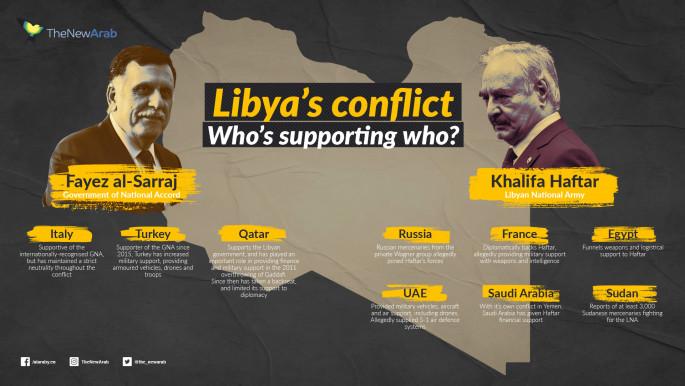Libya rival talks end without ceasefire deal
The talks aim to end fighting between the UN-recognised government in Tripoli and eastern-based military commander Khalifa Haftar, the latest conflict to hit the North African state.
"As both sides agreed to the need to continue the negotiations in order to reach a comprehensive ceasefire agreement, the (UN mission) has proposed 18 February 2020, as the date for a new round of talks" in Geneva, the UN said.
UN envoy Ghassan Salame earlier said the two sides agreed on the need to turn their truce into a full ceasefire but there were "points of divergence".
Five senior officers from the UN-recognised Government of National Accord (GNA) and five appointed by Haftar's Libyan National Army (LNA) took part in the talks as part of a "military commission" set up in broader peace negotiations.
At a summit in Berlin last month, world leaders committed to ending all foreign interference in the country and to uphold a weapons embargo to help end the long-running civil war.
Salame said the embargo was being breached with weapons, ammunition and foreign fighters arriving to support both sides in the conflict.
The oil-rich country has been torn by fighting between rival factions since a 2011 NATO-backed uprising killed dictator Muammar Qaddafi and toppled his regime.
Read also: Libya has been flooded with mercenaries and private military companies
More recently, Haftar's forces launched an assault in April on the GNA's troops in Tripoli. Haftar's forces are mostly based in the east of the country.
 |
| [Click to enlarge] |
The conflict has brought in a range of international players, including Turkey, which has backed the Tripoli-based Government of National Accord, while Haftar has support from Russia, the UAE and Egypt.
Last month, Turkish President Recep Tayyip Erdogan said the Libyan crisis could not be solved by "military means", after talks with his Algerian counterpart in Algiers.
Algeria, which shares a 1,000-kilometre (620-mile) border with Libya, is trying to mediate a political settlement to the conflict gripping its neighbour that threatens regional stability.
"We have said from the beginning that the Libyan crisis would not be resolved through military means," Erdogan told reporters after meeting Algerian President Abdelmadjid Tebboune.
"We are in intense negotiations with the countries of the region and with international actors to secure the ceasefire and facilitate the return to political dialogue in Libya," Erdogan told reporters.
Ankara has sent military aid to the GNA, while Algiers last week hosted a meeting of Libya's neighbours that rejected "any foreign interference" in that country and called for a negotiated settlement.
Tebboune said he was "in complete agreement" with Erdogan on the need to "follow what was decided in Berlin" last Sunday, when world players called for an end to foreign interference in Libya and a resumption of the peace process.
"We are working together for peace through daily and precise monitoring of all developments on the ground," he said.
Erdogan's visit came as the UN mission in Libya said weapons were pouring into the North African country in violation of a 2011 Security Council resolution, and despite commitments by world powers in Berlin.
Follow us on Twitter and Instragram to stay connected



![Lebanese protesters take part in a demonstration in support of Palestinians on 18 May 2021 in Beirut, Lebanon. [Getty]](/sites/default/files/styles/image_330x185/public/2021-06/GettyImages-1232967618.jpg?h=58c8a5e7&itok=0HHt3VmF)